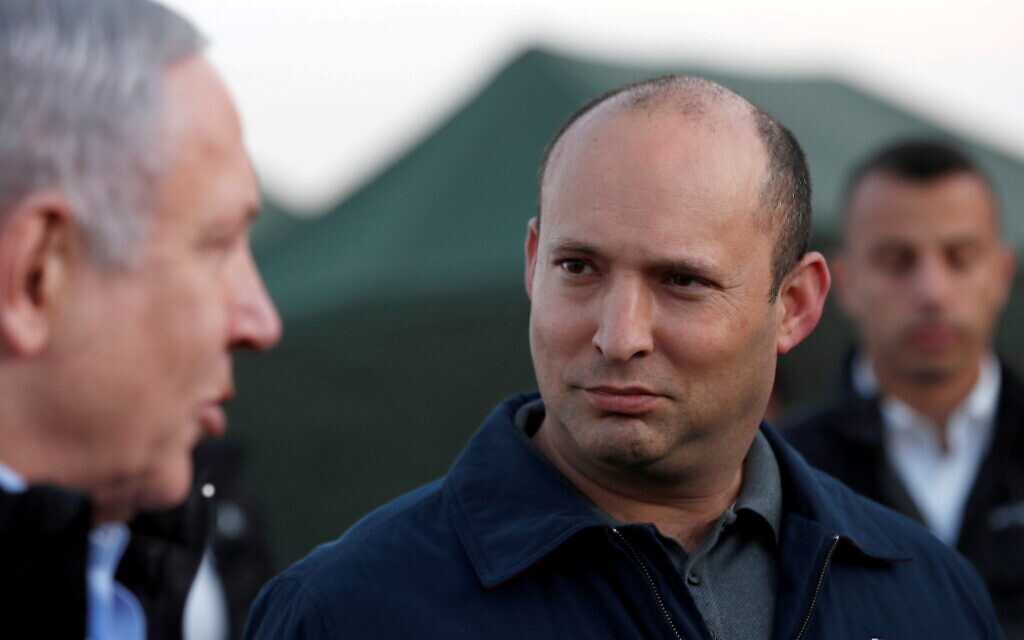Naftali Bennett’s gradual, patient mission to succeed Netanyahu
Our Jerusalem contributor Nathan Jeffay charts the rise of a man he first interviewed in a Ra'anana living room 11 years ago

When I first profiled Naftali Bennett, 11 years ago, a prominent settler told me she considered him an “outsider.” Today, as he holds the balance of power in his hands, nobody could say this.
Bennett, who had chatted to me in his Ra’anana living room in 2010 about his high-tech success and political hopes, had just become CEO of the Yesha Council, the umbrella organisation of settlements. “He’s like a U.N. spectator — he’s an outsider,” grumbled settler leader Daniella Weiss when I asked her about the choice.
But Bennett used his Yesha Council post to jump into politics just as the main pro-settler party, Jewish Home, was in dire straits. He then started blurring the lines of right-wing Israeli politics. For the 2013 election he placed a secular woman, Ayelet Shaked, high on the list of this party that had always been dominated by kippah-wearing men.
Get The Jewish News Daily Edition by email and never miss our top stories Free Sign Up
He was starting to carve out a niche for Likud 2.0 — a political force that could attract right-wing voters, religious and secular, which is not under the control of Benjamin Netanyahu. He has positioned it slightly to the right of Likud, but there is no major ideological gulf.
Indeed, Bennett was Netanyahu’s chief of staff from 2006 to 2008, and the parting of ways is said to have been about personalities — especially a clash between Bennett and Netanyahu’s wife Sara — not about principles.
Had egos played out differently, Bennett could well have been a senior Bibi ally in Likud, but instead he ended up creating a Bibi alternative.
Bennett has continued this path: toning down his religious image and reducing the influence of rabbis on his political life, championing mainstream causes like efficient pandemic management, and assiduously avoiding having his current party, Yamina, pegged as a religious faction.
He has cast himself as relatable, holding babies on election day, and even getting his mum to star in an election video. He wants to be the man who can rival Bibi’s smooth talking English (his parents are American-born) and leadership skills, and beat him in the altruism stakes.
Bennett catapulted himself into politics at a time when right-wing voters felt the only alternatives to Likud were Jewish Home and Yisrael Beytenu, which were seen as sectarian parties for the religious and Russian-speakers respectively.
He changed all that, and inspired copycat attempts. Gideon Saar’s departure from Likud and establishment of the Likud-esque New Hope for this election was an attempt to follow him.
Will Bennett translate his current strength into real political power in the next Knesset? That remains to be seen. But this isn’t the real question.
Look at Bennett’s rise over the last decade, and it’s clear he is playing the long game. Sure, he cares greatly about faring well in the upcoming coalition negotiations, but in a sense the current situation — that the “outsider” from Ranaana holds the fate of the Israeli right and the country in general in his hands — represents the recognition and prominence he has long wanted.
He would certainly like a senior ministerial post in the next government. But all indications are that however Bennett plays things in the coming days and months, he considers it a stepping stone period — a time when the Israeli public recognises the extent of his influence, and he aims at the prime ministership.

Thank you for helping to make Jewish News the leading source of news and opinion for the UK Jewish community. Today we're asking for your invaluable help to continue putting our community first in everything we do.
For as little as £5 a month you can help sustain the vital work we do in celebrating and standing up for Jewish life in Britain.
Jewish News holds our community together and keeps us connected. Like a synagogue, it’s where people turn to feel part of something bigger. It also proudly shows the rest of Britain the vibrancy and rich culture of modern Jewish life.
You can make a quick and easy one-off or monthly contribution of £5, £10, £20 or any other sum you’re comfortable with.
100% of your donation will help us continue celebrating our community, in all its dynamic diversity...
Engaging
Being a community platform means so much more than producing a newspaper and website. One of our proudest roles is media partnering with our invaluable charities to amplify the outstanding work they do to help us all.
Celebrating
There’s no shortage of oys in the world but Jewish News takes every opportunity to celebrate the joys too, through projects like Night of Heroes, 40 Under 40 and other compelling countdowns that make the community kvell with pride.
Pioneering
In the first collaboration between media outlets from different faiths, Jewish News worked with British Muslim TV and Church Times to produce a list of young activists leading the way on interfaith understanding.
Campaigning
Royal Mail issued a stamp honouring Holocaust hero Sir Nicholas Winton after a Jewish News campaign attracted more than 100,000 backers. Jewish Newsalso produces special editions of the paper highlighting pressing issues including mental health and Holocaust remembrance.
Easy access
In an age when news is readily accessible, Jewish News provides high-quality content free online and offline, removing any financial barriers to connecting people.
Voice of our community to wider society
The Jewish News team regularly appears on TV, radio and on the pages of the national press to comment on stories about the Jewish community. Easy access to the paper on the streets of London also means Jewish News provides an invaluable window into the community for the country at large.
We hope you agree all this is worth preserving.
-
By Brigit Grant
-
By Laurent Vaughan - Senior Associate (Bishop & Sewell Solicitors)
-
By Laurent Vaughan - Senior Associate (Bishop & Sewell Solicitors)
-
By Laurent Vaughan - Senior Associate (Bishop & Sewell Solicitors)
-
By Laurent Vaughan - Senior Associate (Bishop & Sewell Solicitors)






















